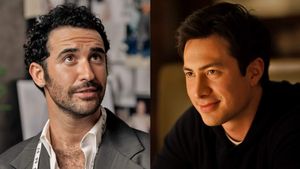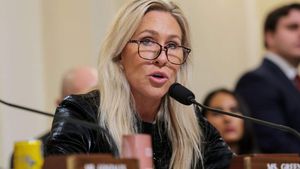Bonnie Bleskachek
knows what discrimination feels like. After she joined
the Minneapolis Fire Department years ago, male firefighters
would leave the room whenever she walked in, a union
official hurled an antigay slur at her because she is
a lesbian, and a male comrade hit her in the head with
a soda can, according to her lawyer.
Bleskachek endured, becoming Minneapolis's first
female fire chief and the only openly gay fire chief
of a major U.S. city. But now, two years after
ascending to the top job, Bleskachek is the one who stands
accused of harassing women.
The 43-year-old chief is on leave as the city
conducts an internal investigation amid lawsuits from
three female firefighters who allege various acts of
discrimination and sexual harassment. Also, a city
investigation found evidence that the department gave
preferential treatment to lesbians or those who
socialize with them.
"It's really kind of unfortunate, because of her
position and her minority status," said Theresa Glomb,
a professor of human resources and industrial
relations at the University of Minnesota. "I imagine,
even if found to be false, it could be very difficult for
her to regain the respect that her achievement deserves."
Bleskachek declined to be interviewed for this
story. Her attorney, Jerry Burg, disputed the allegations.
The lawsuits paint a picture of a woman who let
her love life influence her personnel decisions in
this city of about 390,000. In one lawsuit,
firefighter Kristina Lemon claims that Bleskachek pursued a
sexual relationship with her and that when Lemon
rebuffed her, Bleskachek denied her training and
advancement opportunities. Bleskachek denies the
allegations, which span a 10-year period, in which
Bleskachek moved up the ranks from captain to chief.
The two other lawsuits center on a test for
promotion to battalion chief that was suspended and
eventually canceled. One of the plaintiffs,
Bleskachek's former partner, Jennifer Cornell, claims
Bleskachek suspended the test after Cornell passed the
exam but Bleskachek's current girlfriend did not.
Cornell also claims she was denied other training
opportunities that could have led to higher pay.
Bleskachek denies the decisions were personal.
In court documents, Burg said the decision to deny
training was made by Cornell's immediate supervisor.
In addition, Burg said, the test was found to be flawed
after only two people passed it, and several
administrators, not just Bleskachek, were involved in
the decision to cancel it.
"It boggles my mind that the public jumps to the
conclusion that these decisions are motivated by the
desire to have sex with someone who rebuffs them" or
because of past romantic relationships, Burg said.
Under a settlement that was reached last week
and awaits city council approval, both plaintiffs in
the dispute over the exam will be promoted to
battalion chief, said their attorney, John Klassen. In an
interview, Lemon said she was optimistic at first to
see a female appointed chief. "But it is disheartening
to know that we don't get better, we don't learn," she
said. "Even after we've gone through hardships, that
we can turn around and perpetrate the same behavior.... It's
a sad thing."
In 1989 Bleskachek became the 10th woman to join
the Minneapolis department, which had hired its first
female firefighter just three years earlier. She
cofounded a group that helps women train for the
firefighting test, and she helped get the city to change one
part of the grueling physical test so it more
accurately reflected the tasks required on the job.
As of March, 17% of the city's 450 firefighters
were women, the highest percentage among urban fire
departments in the nation, according to Women in the
Fire Service.
"She put a lot of time and effort into making
this a job that's available for women," said Tom
Thornberg, president of the Minneapolis firefighters union.
Bleskachek was appointed chief in 2004 by Mayor
R.T. Rybak. Rybak's spokesman said the mayor had no
comment on the dispute.
Burg said Bleskachek did her job well and worked
to change the perception of a firehouse as a boys'
club. He said the allegations are "a terrible
negative." "I think it feeds into the bias that lesbians
are masculine and men behave like pigs, therefore lesbians
are pigs," the lawyer said. "The implications of this
for women: I think that they are frightening."
Thornberg, the union president, said morale
among the rank-and-file is pretty good, considering
the publicity surrounding the chief. "When it gets
into the press, the picture is painted that everyone is in
the firehouse having sex and doing all of these
things. Well, that's not the case," he said.
"We're all professionals. We're trained to do
our job.... Everybody would just like to see this over
so that we can move on and get our good name back and
continue to do what we do." (Amy Forliti, AP)




































































Charlie Kirk DID say stoning gay people was the 'perfect law' — and these other heinous quotes